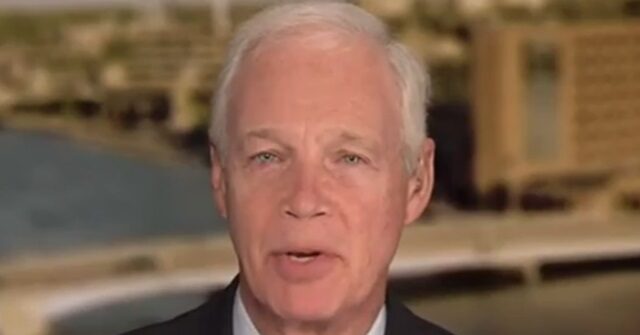Senator Ron Johnson (R-WI) recently appeared on Newsmax TV’s “National Report,” where he criticized White House Press Secretary Karine Jean-Pierre for her statements regarding President Joe Biden’s remarks on former President Donald Trump’s supporters. Johnson asserted that Jean-Pierre was being dishonest when she claimed that Biden did not intend to label Trump supporters as “garbage.” This comment came in the context of a broader discussion about the potential impact of Biden’s rhetoric on voter turnout among Republicans, particularly those who may be hesitant to support Trump in the upcoming election.
Co-host Emma Rechenberg raised concerns about Biden’s remarks and questioned whether the president’s misstep might discourage undecided Republicans from voting for Trump. Biden had released a statement on social media platform X in an attempt to clarify his statements, explaining that the term “garbage” referred to specific remarks from an insult comic at a Madison Square Garden rally rather than a blanket statement about Trump supporters. Johnson and Rechenberg discussed the nuances of Biden’s statements and the ongoing effort by the White House to clarify the president’s intent amid rising criticisms.
In her clarification, Jean-Pierre emphasized that Biden did not mean to disparage Trump supporters and stated that it was important to present an accurate representation of his remarks. Despite her assertions, Johnson maintained a strong disagreement with her interpretation, arguing that it was clear Biden held a disparaging view of a significant portion of the American populace that supports Trump. He referenced other prominent Democrat figures, including Hillary Clinton and Barack Obama, who have likewise made comments that could be perceived as dismissive of conservative voters, reinforcing his point that Democratic leadership does not genuinely respect the views of a large segment of the American public.
Johnson’s comments reflect a broader sentiment among Republican leaders who believe that the Democratic Party’s rhetoric is alienating voters. He pointed out a pattern where Democrats consistently label their political opponents in derogatory ways. This ongoing narrative of division has ramifications for election dynamics, as it can solidify the resolve of Republican voters to turn out in response to perceived attacks on their beliefs and identities. The conversation highlights the fraught political climate and how language can significantly shape voter perceptions and actions as the election cycle intensifies.
In considering the long-term implications of Biden’s remarks, both Johnson and Rechenberg speculated on whether such statements could play a role in galvanizing Republican voter turnout. Given the polarized nature of contemporary American politics, the way leaders communicate their views can have lasting effects on their supporters’ enthusiasm and willingness to engage in the electoral process. The potential for backlash among Trump supporters was a key concern, as statements perceived as insulting could push hesitant voters to align more closely with him out of a sense of loyalty or indignation.
Overall, the debate surrounding Biden’s “garbage” comment underscores the potent mix of political rhetoric and voter sentiment. Johnson’s accusations against the administration suggest that Republicans are actively looking for perceived weaknesses in Biden’s messaging to mobilize their base ahead of the elections. As both parties navigate the charged atmosphere leading up to the election, how they position their narratives will be crucial in determining voter turnout, particularly for demographics that feel marginalized or insulted by the opposing party’s leadership. As the election cycle progresses, the ramifications of these exchanges will likely become increasingly significant, potentially shaping the political landscape for years to come.

